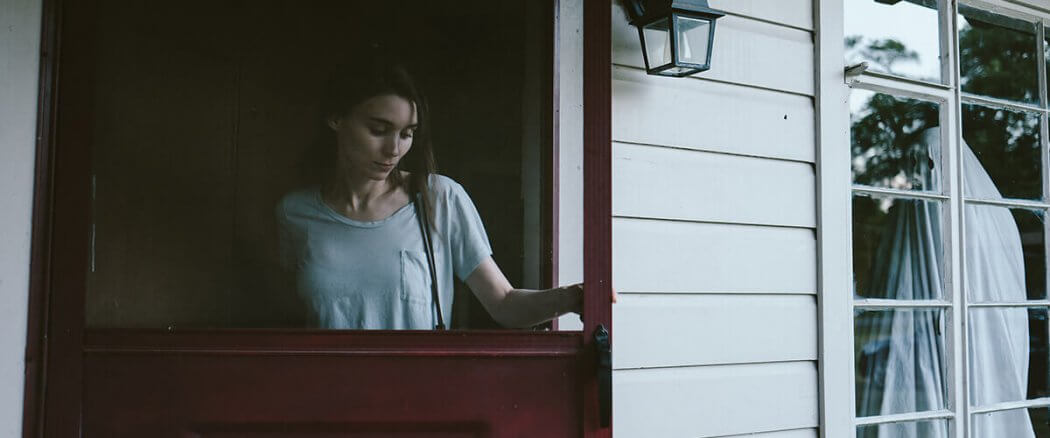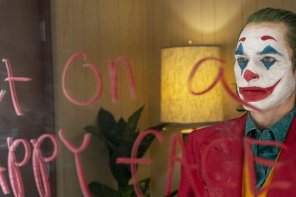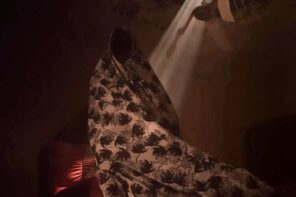A shimmer of light against a dark wall, a softly shutting door in an empty room, a sudden wakefulness and knocking in the night. Why do houses become haunted? What holds a ghost to a place? What memory, what seeking, what revelation will trigger release? Short on plot, long on mood and themes, David Lowery’s A Ghost Story asks for patience from its audience. Casey Affleck is the titular, bed-sheeted Ghost and Rooney Mara is his wife, left to pick up the pieces after his death in a car accident. Like all ghost stories, this is a story of a wandering spirit — and wander it does, but there is something profound to be discovered at the end of this journey.
Standing at the Threshold
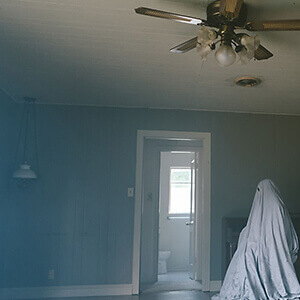 A Ghost Story is all about thresholds. Ghosts are — by their very presence in the world — liminal beings. They are between life and death, between existence and non-existence, between material and immaterial. Lowery’s decision to make his ghost a Charlie Brown-style sheet with eye-holes makes the point all the more obvious: ghosts are out of place. This would have been a different movie if the ghost had looked like a pale Casey Affleck with a head wound – a more sentimental story or a more gruesome one (think the ghosts in The Sixth Sense). By anonymizing Affleck the ghost story becomes less about his specific situation and more about a universal search for meaning that gradually takes the foreground.
A Ghost Story is all about thresholds. Ghosts are — by their very presence in the world — liminal beings. They are between life and death, between existence and non-existence, between material and immaterial. Lowery’s decision to make his ghost a Charlie Brown-style sheet with eye-holes makes the point all the more obvious: ghosts are out of place. This would have been a different movie if the ghost had looked like a pale Casey Affleck with a head wound – a more sentimental story or a more gruesome one (think the ghosts in The Sixth Sense). By anonymizing Affleck the ghost story becomes less about his specific situation and more about a universal search for meaning that gradually takes the foreground.
After his death, Ghost can do nothing but stand mutely at the fringes of the living world, helpless to interact. Lowery excels at framing these scenes. Shot in a constricting 4:3 aspect ratio, the ghost can often get lost at the edges, blurred into the background, or faded into underexposed night shots. The ghost is rarely centered onscreen, especially in the beginning when the audience is just as confused as Ghost about what is going on. Occasionally Ghost affects the physical world — scratching on a wall, banging on a piano, flipping pictures off tables — but generally this ghost is a passive observer: watching, listening, moving from room to room as time flows in stops and starts around him.
Time Traveler
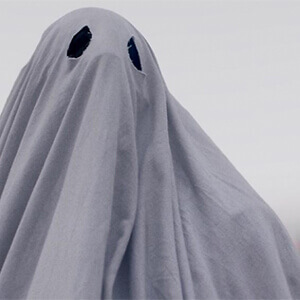 Time in A Ghost Story is experienced objectively rather than subjectively. It is a thing, like the walls Ghost can sometimes pass through, that exists outside of Ghost’s control with rules of its own. There are periods where we experience the world in real-time, second by second where the only way to see things unfold is uncut and as-it-happens. One scene in particular is a single 9-minute shot of Rooney Mara eating an entire pie. No dialogue, no cuts, no other action… just Mara cutting into a large pie with a fork, in abject grief, and eating it one bite at a time. It’s impossible to describe how boring, yet necessary this scene is.
Time in A Ghost Story is experienced objectively rather than subjectively. It is a thing, like the walls Ghost can sometimes pass through, that exists outside of Ghost’s control with rules of its own. There are periods where we experience the world in real-time, second by second where the only way to see things unfold is uncut and as-it-happens. One scene in particular is a single 9-minute shot of Rooney Mara eating an entire pie. No dialogue, no cuts, no other action… just Mara cutting into a large pie with a fork, in abject grief, and eating it one bite at a time. It’s impossible to describe how boring, yet necessary this scene is.
Throughout the film time becomes more fluid. As Ghost experiences his wife’s eventual exit from the house, he finds he must stay and haunt that space — from occupant to occupant. A young, Latino family; a hipster party house; a collapsing relic; a skyscraper in a futuristic city; we see the stars turn in the sky. The farther we get from the moment of Affleck’s death, the larger the jumps are through time.
Eventually time wraps back on itself and we experience the land on which the house will someday be built. We witness a white migrant in the 1800s marking off the shape of the first room. We see the moments before Affleck’s death, we see the ghost watching itself watching Mara’s grief as the loop starts to repeat.
All The Meaningless Days
As A Ghost Story pivots to its third act, during a party filling the small house, we come across another uncut scene that will test the viewer’s patience: Will Oldham, aka punk-folk musician Bonnie ‘Prince’ Billy (simply listed as “Prognosticator” in the credits) waxes at length about the meaninglessness of life. “Do you have God?” he asks a nameless friend. “No,” she replies. Then, he concludes, all is meaningless. All of this — people, memories, works of art and achievement, galaxies, stars and atoms – will all be gone when the universe dies. Or, as the cheery poet wrote in Ecclesiastes “…the dead know nothing. They have no further reward, nor are they remembered. Whatever they did in their lifetime — loving, hating, envying — is all long gone. They no longer play a part in anything here on earth. Live happily with the woman you love through all the meaningless days of life that God has given you under the sun… Whatever you do, do well. For when you go to the grave, there will be no work or planning or knowledge or wisdom.”
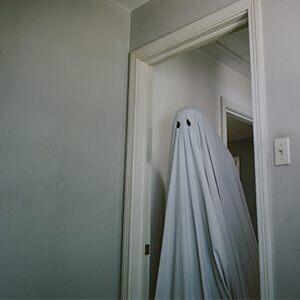 The Prognosticator discusses Beethoven’s contributions to humanity, arguably one of the most influential, creative and long-lasting voices in our history. Beethoven’s work certainly outlasted his own life, and will certainly outlast the lives of everyone reading these words, but eventually even it will be forgotten. By rejecting a future hope, all things are ultimately meaningless. What meaning does Ghost find as he exists in the present, future, and past? Every temporary thing, in a universe that must end in entropic death, is without ultimate meaning. On the other hand, every thing in a universe created and sustained by an eternal, transcendent Other inherently possesses meaning. That all of this — people, memories, works of art and achievement, galaxies, stars and atoms — will remain firmly fixed in the “mind” of an infinitely existing observer: that’s an eschatology of hope. No matter how inconsequential or brief, every assemblage of matter is known by the One who loved it enough to bring it in to being.
The Prognosticator discusses Beethoven’s contributions to humanity, arguably one of the most influential, creative and long-lasting voices in our history. Beethoven’s work certainly outlasted his own life, and will certainly outlast the lives of everyone reading these words, but eventually even it will be forgotten. By rejecting a future hope, all things are ultimately meaningless. What meaning does Ghost find as he exists in the present, future, and past? Every temporary thing, in a universe that must end in entropic death, is without ultimate meaning. On the other hand, every thing in a universe created and sustained by an eternal, transcendent Other inherently possesses meaning. That all of this — people, memories, works of art and achievement, galaxies, stars and atoms — will remain firmly fixed in the “mind” of an infinitely existing observer: that’s an eschatology of hope. No matter how inconsequential or brief, every assemblage of matter is known by the One who loved it enough to bring it in to being.
The ghost in A Ghost Story wanders through his small world with a singular purpose: to recover something that has been lost. This search is important, but Lowery’s point seems to be more about existential reflection than anything else. But that’s a pretty big thing. Movies generally don’t leave much space for that kind of reflection. If you’re looking for a supernatural drama with a be-sheeted protagonist, almost no narrative dialogue, and room to consider life, death, relationships, and time: you’ve come to the right place! If not, there should be a standalone Bumblebee movie with John Cena coming along any day now to assuage your dread.
NOTE: Do check out Daniel Hart’s original soundtrack. It is outstanding on its own merits, but within the film it is riveting.

